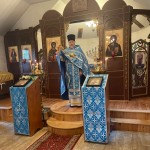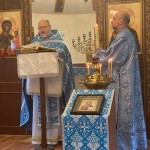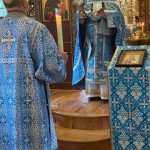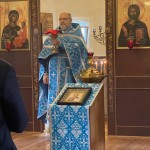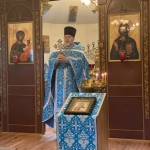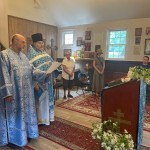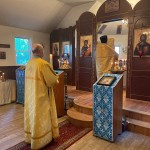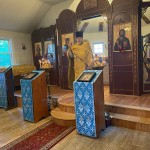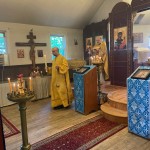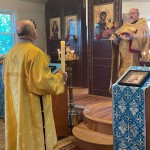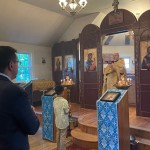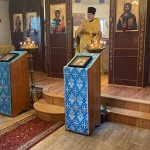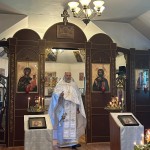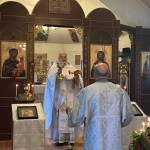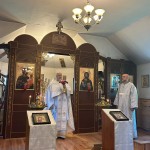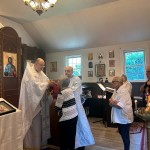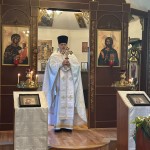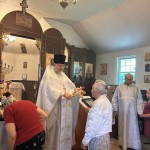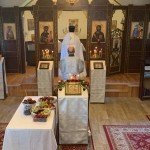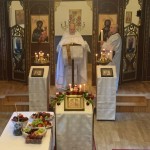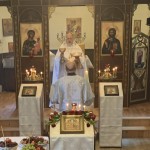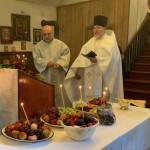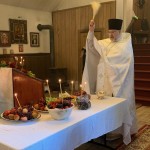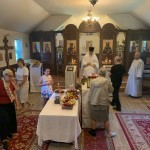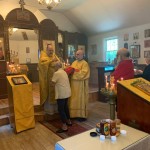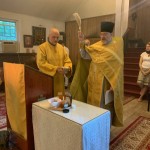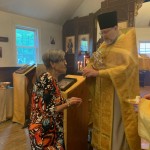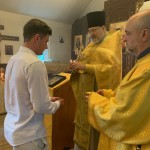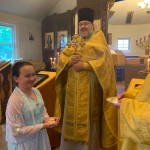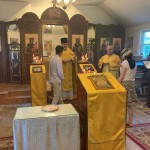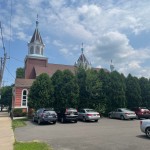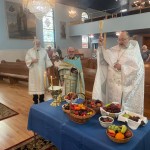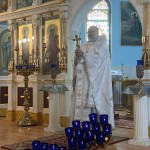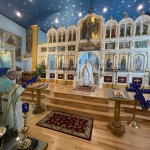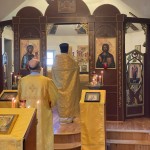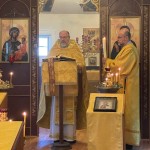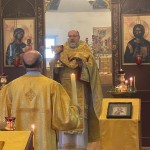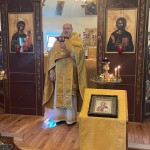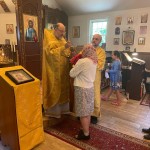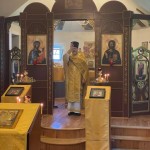On August 28, on the feast of the Dormition of the Most Holy Mother of God, we held a nice celebration at St. George Church. Our Rector, Archpriest Igor Tarasov served the Divine Liturgy. After the Gospel lesson he preached the following homily:
“Dear Father, dear brothers and sisters in Christ! Today we celebrate the most important feast in honor of the Most Holy Mother of God, Her Dormition. This is the day when our Lady fell asleep and ended Her earthly life. She was taken up to heavenly glory along with Her soul and body. Holy Scripture does not tell us about the last days of the Most Holy Mother of God. In fact, it does not tell about Her much at all. This is why the Protestant churches which do not recognize any other sources of Revelation except the Bible, do not honor Theotokos at all. But we, Orthodox Christians, acknowledge two sources of God’s Revelation, Holy Scripture and Holy Tradition. While the Scripture does not tell us about today’s feast, it is very much described in the writings of the holy Fathers of the Church, it is very much mentioned in the Holy Tradition. Thus, let us recall what the Tradition tells us about it”.
“According to the ancient Christian tradition, the Most Holy Mother of God lived in the household of the Holy Apostle and Evangelist John the Theologian to whom our Lord Jesus Christ entrusted His Blessed Mother when He was dying on the cross. St. John and the Blessed Mother lived in several places, but later She came back to Jerusalem, to finish Her earthly life at the holy place of Passion and death of Her divine Son. The Most Holy Mother of God attended the place of the Lord’s Tomb where She prayed. One day holy Archangel Gabriel appeared to Her at the Lord’s Tomb and announced that shortly She is going pass away. The Blessed Mother prepared to that day. Now a great miracle happened: all holy Apostles were taken by invisible angelic force and arrived in Jerusalem around the bed of the Blessed Mother to farewell Her. She fell asleep at the third hour which is in the morning. After that holy Apostles buried Her conducting the funeral rites. The burial procession went through the city of Jerusalem. Some Jewish people hostile to the Christians attempted to attack the Apostles but the procession was miraculously enveloped with the cloud, so they could not see and find it. All they did is to hear the chants of the funeral prayers and hymns sung by the Apostles. One of the Jewish priests named Apphonias reached the procession and tried to overthrow the coffin with the holy body of the Theotokos. But the angel invisibly cut his hands off. Apphonias repented, was healed and followed the procession becoming a zealous follower of Christ”.
“After the body of the Most Holy Mother of God was buried, She appeared to the Apostles when they came back to the house to eat together. The Holy Mother said to them: “I will always stay with you!” On the eighth day after the Falling Asleep of the Most Pure Virgin holy Apostle Thomas arrived in Jerusalem. He desired to venerate the holy body of the Most Holy Mother of God. When the Apostles opened Her tomb to let St. Thomas to venerate the relics, they discovered that it was empty. Our Lord Jesus Christ did not allow His Mother’s body to stay in the tomb but took it to the heavenly glory”.
“Thus in the Most Holy Mother of God the statutes of nature are being overcome, She did not die, She fell asleep to be in the Kingdom of Her Son. Death is conquered again. As the Son of God and Son of Mary conquered death by His own death in His holy Resurrection, so He conquered death in His Mother’s Dormition. Death is a result of sin. Thus, let us fight the sin to acquire life. It is hard, but if we do fight the sin God is coming to help. He will make miracles for us. In today’s feast we hear about a number of unbelievable miracles. We may even say that the whole story is so unbelievable. But even in our own life God can perform wonderful and incredible things to make us alive in His heavenly Kingdom. Let us strive for it with the help of the Most Holy Mother of God who is saving our souls from death”.
The choir director prayerfully performed hymns dedicated to the Most Holy Mother of God and Her Dormition during preparation for Holy Communion.
Our festal service was attended by Abbot Eutychius (Dovganyk), cleric of the ROCOR who prayed in the altar.
Following the dismissal of the Liturgy the Rector and the altar server performed the rite of glorification singing the troparion, kontakion and magnification of the feast before the icon of the Dormition in the middle of the church. Then the Rector congratulated all the faithful on the feast.

